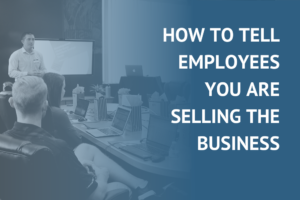One of the first questions I get from business owners when they sit down with me is, “How long does it take to sell a business”?
The short answer is between 6 to 9 months. The actual time it will take from when you sign a listing agreement to when your deal closes depends on a variety of factors. The asking price, marketing, buyer type, operational structure, and business characteristics all play into deciding how long it will take to sell a business.
Closing Your Deal
Like I just mentioned above, the time it takes to close your deal depends on a lot of different factors. Industry averages are great but they fail to take into account your unique business. The structure of both your company and your deal all affect how long it will take for your business to sell. Your company’s management structure, location, and even who you are as an owner all influence your timeline. As for the deal, make sure it is structured favorably for both sides of the transaction and that your documentation is timely and accurate.
Above all else, do your research when choosing a business broker to assist you in this process. Their marketing strategy, negotiation experience, and professional network can determine both the time it takes to sell and the quality of potential buyers to choose from. Like anything in business, your preparation and knowledge often determine the outcome. In the following paragraphs I will detail some individual factors that can directly affect how long it takes for your business to sell.
1. Your Asking Price Is Critical
Your asking price matters…A Lot!
It needs to be fair and you as the owner need to have realistic expectations. We understand that you put years of hard work into this company, but the market doesn’t pay for sentimental value. It is important to list your business based on a combination of its individual numbers and market trends. Your business broker will guide you through this process and help you determine what price is best to go to market with. If a business is overpriced it will attract far less interested buyers and ultimately take longer to sell.
The sale price itself, regardless of whether or not it’s fair, has an impact on how long it takes to sell your business. As the sale price goes up, it takes longer and longer to sell. This is because the available pool of qualified buyers diminishes as the financial commitment to invest goes up. The due diligence and lending process also takes more time when dealing with larger businesses. A high asking price is hopefully associated with a large operation, this means that to truly analyze everything you have to be willing to invest the time. Stay tuned for an example below showing some data on how asking price influences your deal’s timeline.
2. Choose The Right Business Broker
Having the right business broker for your deal can greatly affect the time it takes to close. It is important to know how a broker can specifically assist your deal before signing the listing agreement. Their experience level, marketing, and networking ability all plays into the success of your deal. Go for industry experience and not just total deals closed or years in business. General experience is important but each broker has specific industries they have either worked in or performed well in over the years. Whenever possible try to find a business broker with a track record of success in your particular business’s industry.
It is also important to find out exactly what they are going to do to get potential buyers interested in your business. Everyone is listing on the same sites these days, so what is it that they do differently? Their marketing, website traffic, and network all affect how many buyers see your listing. The more buyers reached, the higher the sale price and the faster it will sell.
3. Operations Are Important
The organizational structure of your day to day operations is an important factor. Buyers are investing in something that they will have to continue to run. They want to see plug and play systems, well developed procedures, and a team of empowered employees. If you as an owner are the glue that holds everything together, that can be a problem. The ability for your business to operate without you is attractive to buyers. They need to feel secure that there is an ability to make operational decisions without your involvement and that key relationships won’t walk out the door when you leave.
Part of a good exit strategy is building your business to succeed without you. It can be hard but the more you can remove yourself from daily operations the better. Buyers are looking for enticing deals that look manageable and one of the main contributors to that is your business’s operational requirements.
4. What’s The Demand For Businesses In Your Industry?
Not all industries were created equal. Some appeal to a much wider market of potential investors than others. A property management company with consistent and expected revenues will have a much higher demand than a residential plumbing company. Things like working hours, type of work, book of business, business to business, business to consumer, etc all determine the market interest on your industry. Ultimately what we are saying is that the lifestyle that an owner will have if they choose to buy your business is a massive determining factor in the level of interest your deal will attract.
5. Location, Location, Location
Location is huge! Where your business is located will directly determine the time it takes to sell. Locally things like zip code, storefront, and proximity to other businesses will all influence the level of interest in your business. Potential buyers are looking for signs of sustainability and growth. For example, retail and service businesses will sell a lot faster if it happens to be in a desirable part of town with a lot of customer traffic. Like we said above, lifestyle is a big part of this process and the location of your business plays into that.
An aspect of location that is a little more out of your control is the state your business is in. Different parts of the country attract a different amount of qualified buyers. That’s to be expected even if you base it on population alone and not industry, but the difference can be more significant than you’d think. I’ve seen as much as an 80 day difference in average time it takes a business to sell between separate states. That’s almost 3 months! So make sure to do your research ahead of time so you know what to expect.
So, How Long Does It Take To Sell A Business?
As we stated above, the average time it takes to sell a business is 6 to 9 months. But, as you can see from the information I’ve covered in this article there is no real way to tell for sure. Each business is a 1 of 1, they are unique and present a specific opportunity for investors. Maybe the first potential buyer falls in love with it and the deal closes in record time, or maybe it takes months of showings to find the right fit. There is no disputing that proper planning and hard work can ensure your business is more marketable, but a portion of this process will be up to outside factors.
One of the best ways to get an idea of how long this process should take is simply by looking at your listing price. Like we’ve already talked about, as the price goes up so does the time it takes to sell your business. This is normal and to be expected based off the number of available investors in the market once the asking price gets above a few million.
Take a look at some averages based on sale price and days on the market
| Sale Price | Average Time |
| $300,000 to $600,000 | 245 days to sell |
| $600,000 to $1,000,000 | 294 days to sell |
| $1,000,000 to $1,600,000 | 299 days to sell |
| $1,600,000 to $2,500,000 | 303 days to sell |
A look at some very recent data from Q3 2019 confirms what you see in this chart. The average time a business was on the market before it sold was 169 days for all businesses sold. However, for businesses listed at over $1 million the average number of days it took for a business to sell was 198 days.
Let’s See A Timeline…
After explaining some of the potential factors that will affect your deal’s timeline and covering some industry averages, I feel that it would be beneficial to see a sample timeline of each step in the process. This deal timeline is meant to give you a rough idea and not to serve as expectations if and when you decide to sell your business.
- Listing Business for Sale – Day 1
- The starting point of this process is deciding to list your business. A lot may have gone into preparing the business for this moment but the counter doesn’t start until your business is listed.
- Prepare Documentation and Begin Marketing – 30 to 45 Days
- During this step you and your business broker will compile financials and begin to plan a marketing strategy. The more information you can provide the more targeted your approach will be and the easier it will be to determine your ideal buyer.
- Screening and Selecting a Potential Buyer – 60 to 90 Days
- If step 2 was done successfully you should have a qualified group of investors that now your broker has to screen. The best of the potential buyers then meet you and may request a showing of your business. From here the negotiating process begins and you will begin to receive offers.
- Financials and Due Diligence – 45 to 60 Days
- This step is critical and is where a lot of deals can fall apart. The buyer must obtain approval on financing if necessary, which can take a long time depending on the loan amount. Both the buyer and the seller will also enter into the due diligence stage, where basically their teams fact check and guarantee all the details about the deal.
- Complete Closing – 15 to 30 Days
- Once step 4 is complete and the financials are in order the closing can be scheduled. After closing the business will be officially sold. However, you may be expected to stay on for a period of time to assist in training and transitioning if the deal specifies.
Conclusion
If my math is correct that timeline should fall well within the national average of 6 to 9 months. But, if this article has taught you anything it’s that the actual number will be individual to you and your business. Hopefully you now have some realistic expectations for what goes into this process should you ever decide to sell your business. Consider planning and structuring your business to have an exit strategy so that you avoid some of the pitfalls and you give yourself the opportunity to maximize your hard work.
For advice, questions, or inquires about any of the information or services discussed in this post feel free to reach out to us here.




